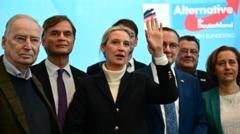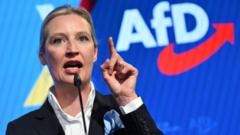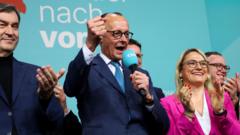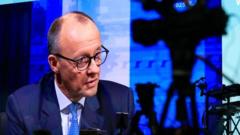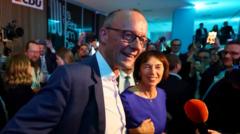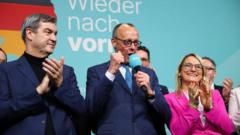As he prepares for the upcoming parliamentary elections, Merz contemplates the implications of government interventions on daily life and the economy.
**Merz Shifts Gears Ahead of Critical German Elections**

**Merz Shifts Gears Ahead of Critical German Elections**
Friedrich Merz navigates political turbulence while aiming for the chancellorship amid controversies.
In Stromberg, Germany, Friedrich Merz, the leader of the Christian Democratic Union (CDU), finds himself on the campaign trail ahead of the pivotal parliamentary elections scheduled for February 23. Reflecting on a recent controversial move to collaborate with far-right factions in an attempt to reform migration laws, Merz is taking steps to regain his footing amid discontent from some citizens and political rivals. Still, recent polls suggest that he may weather the storm better than expected.
During a public event, Merz used a discussion about modern car technologies to illustrate the restrictive nature of current government regulations, likening the annoyance of speed alerts in new vehicles to broader government intrusions affecting economic growth. "If you exceed the speed limit by even a small margin, your car chimes incessantly," he remarked, drawing a parallel to the frustrations many Germans feel regarding bureaucracy.
The CDU leader faced backlash after his vote alongside right-wing counterparts, traditionally seen as taboo within the party’s ranks, which was met with an immediate outcry from various demographics. Yet, despite the tumult of the past two weeks—including challenges to his leadership from opposition candidates—internal polling indicates that support for Merz has held steady, though opinions of him have become more divided.
As he steers towards election day, he is setting his sights on positioning himself as the voice of reason against a backdrop of political and economic uncertainty. With the potential for a “directional election,” Merz intends to shift the focus onto economic revitalization and how the government can work to alleviate citizen frustration, reevaluating the regulatory landscape as a core aspect of his vision for Germany’s future.
The final stretches of the campaign will be crucial for Merz as he strives not only for his own political survival but also to redefine the CDU’s role in Germany’s political landscape.
During a public event, Merz used a discussion about modern car technologies to illustrate the restrictive nature of current government regulations, likening the annoyance of speed alerts in new vehicles to broader government intrusions affecting economic growth. "If you exceed the speed limit by even a small margin, your car chimes incessantly," he remarked, drawing a parallel to the frustrations many Germans feel regarding bureaucracy.
The CDU leader faced backlash after his vote alongside right-wing counterparts, traditionally seen as taboo within the party’s ranks, which was met with an immediate outcry from various demographics. Yet, despite the tumult of the past two weeks—including challenges to his leadership from opposition candidates—internal polling indicates that support for Merz has held steady, though opinions of him have become more divided.
As he steers towards election day, he is setting his sights on positioning himself as the voice of reason against a backdrop of political and economic uncertainty. With the potential for a “directional election,” Merz intends to shift the focus onto economic revitalization and how the government can work to alleviate citizen frustration, reevaluating the regulatory landscape as a core aspect of his vision for Germany’s future.
The final stretches of the campaign will be crucial for Merz as he strives not only for his own political survival but also to redefine the CDU’s role in Germany’s political landscape.




